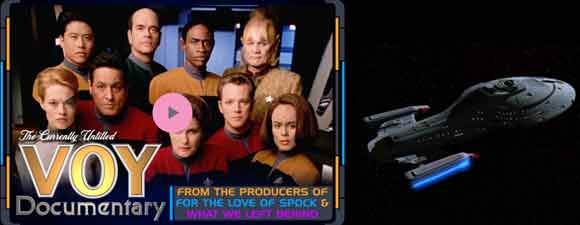Retro Review: The Swarm
6 min read
theswarmbanner
As the EMH’s program begins to fail, Voyager enters the space of a viciously isolationist species.
Plot Summary: On the holodeck, the Doctor broadens his programming to practice singing opera, while aboard a nearby shuttlecraft, Paris and Torres suffer an attack by an unknown species. When the Doctor returns to Sickbay to treat their injuries, he discovers that portions of his memory have been wiped. Neelix warns Janeway that the mysterious swarming species who attacked the shuttle are known to be very dangerous, but Janeway refuses to consider diverting from Voyager’s course through their territory. Kes summons Torres away from her research on the Swarm’s sensor net to examine the Doctor, whom Torres concludes has added too many subroutines to his matrix. Reinitializing the Doctor’s program would solve the problem but erase his personality and all his memories, so Torres calls up the EMH diagnostic tool – a hologram of Dr. Louis Zimmerman – which scoffs that the EMH has been overtaxed by trivial emotional subroutines. Meanwhile, Janeway takes Voyager across the border of the Swarm’s space, but after trying to rescue an alien who warns that the Swarm will try to siphon the ship’s energy and crush the hull, Voyager is detected and surrounded by small pods. Aliens begin to board the ship, but Kim is able to use an energy pulse to send feedback to all of the pods, disabling or destroying most of them. The rest then back off, allowing Voyager to continue through the Swarm’s space. Kes proposes that Zimmerman’s diagnostic program merge with the Doctor’s matrix, which destroys the Zimmerman hologram yet saves the Doctor, though Torres fears that much of his programming may be lost. Indeed, when the Doctor comes back online, he speaks as brusquely as the diagnostic tool and doesn’t remember that Kes has had medical training, but soon he begins to hum the opera he had been rehearsing.
Analysis: “The Swarm” should have jettisoned pretty much everything to do with the Swarm – yes, including the title – and instead focused on the heart of this episode, which is the Doctor’s need to expand his matrix and the rest of the crew’s interaction with the holographic diagnostic version of Zimmerman. Voyager‘s character-driven subplots frequently outshine the science fiction-space opera main plots, and “The Swarm” is a perfect example of what’s wrong with the dual-story formula. We get a gimmicky alien menace that often has elements in common with some species we’ve already seen (in this case, the creatures from “Elogium”), to which the crew attempts to respond first with diplomacy, then with weapons, before finally saving themselves with a technobabble scientific solution. Meanwhile, a character is experiencing a crisis that may or may not be related to the presence of the alien menace, but just when the character’s emotional issues start to become interesting and relatable, that storyline gets pushed aside in favor of a space fight or shipboard special effects. The original Star Trek and the next generation had their share of similarly structured episodes, but the presence of the Federation and a broader alliance allowed for more consistent villains and stronger story arcs, particularly on the later series where characters had families and home planets to explore. Voyager‘s crewmembers have fewer options for exploring their backstories, since they can only encounter family members and youthful tormentors on the holodeck and in AU fantasy sequences. So whenever the writers came up with a really juicy storyline about what makes one of them tick, they should have run with it. Instead this wonderful glimpse at the Doctor’s inventor gets buried under bug ships which appear and then disappear without making a bit of impact on the overall series arc or the crew.
I’ve never made it a secret that I hated what happened to Voyager when Seven of Nine arrived on the show, shifting the focus away from the command team with often painful results, but at this point in the third season, it’s easy to see why the writers thought some sort of big shake-up was necessary. We’re seeing too many A plot/B plot episodes without many new ideas about where to take the characters; in “The Swarm,” Harry Kim saves the ship, yet it’s scarcely noted by anyone since the Doctor gets all the character drama. One week Janeway’s obsessed with maintaining Starfleet regulations even at the risk of her crew’s lives; the next week she’s blithely dismissing regulations in order to avoid adding one year to a journey that’s expected to take another 68 – and definitely risking her crew’s lives in the process. How come Neelix never warned her that they’d very likely encounter this terrible alien foe, so they could start discussions about what might be necessary to cross or avoid the Swarm’s space? Hello, Captain, the decision to risk your ship is just as rash as your spontaneous choice to violate rules you’ve insisted upon for the crew! Tuvok disapproves of this encroachment upon the territory of an alien species on ethical grounds, not just because it may be unsafe! Remember how, a couple of weeks ago, you were saying that Kirk and Sulu would have been tossed out of 24th century Starfleet? This little invasion might be something one of them would do, but I’m not sure why it’s more ethical than letting the Kazon have a food replicator. We’re probably not supposed to think about it too much because the battle with the Swarm is supposed to be more exciting than the events that trigger it. As in “The Chute” the previous week, Janeway’s biggest defining moment comes when she picks up a weapon, which isn’t usually a Starfleet captain’s most admirable quality. I also dislike the abruptness with which she deals with the EMH, who requires Kes to plead his case with the captain once Torres suggests resetting him, and who scarcely seems interested that she could lose the only trained doctor on the ship.
The Doctor is more interesting than the new aliens, which would likely be the case even if the aliens were being developed as ongoing adversaries rather than a menace of the week. It’s always a delight to watch Picardo perform with himself, playing different versions of Zimmerman’s personality as it evolves to fit different roles, and his giant crankypants reaction to learning of a hologram’s hobbies is great fun. But underlying the immediate crisis, in which the Doctor nobly agrees to be reset so that he can be useful to the crew – just as the diagnostic Zimmerman allows himself to be erased for the good of the Doctor – is an existential dilemma much like an android’s, in which a being created to be sentient must face his lack of autonomy and legal rights. Data, at least, could harbor fantasies about running away if he wished, whereas the Doctor is tethered to Voyager. The sincerity of his suffering moves Torres, whose first reaction is to approach his failing memory as an engineering problem, then to return Zimmerman’s snark with snark. Kes isn’t as witty sparring with Zimmerman, but she’s passionate in her efforts both to make the Doctor remember their shared past and to convince Janeway and Torres that that past is worth taking some risks to preserve. Of course, the funniest moments involve the EMH himself, both at the start when he argues with a holographic diva about their differing approaches to La Boheme and later when he debates with his inventor about things like why he might benefit from romantic subroutines. Zimmerman sounds jealous the EMH may see more action in that regard than his original does, which may be true of others on Voyager as well, given Chakotay’s distance from Janeway and Torres’ rejection of a date with Paris. Given the proximity to “The Chute,” Tom’s casual proposition sounds less like growing love for B’Elanna than an opportunity to reinforce Paris’s rampant heterosexuality. The characters aren’t focused enough for what will become Voyager’s most impressive relationships.






